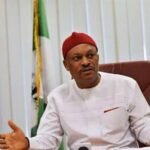*SUMMARY**Clarification needed on government’s use of ways and means financing**Success of domestic dollar bond in financing infrastructural projects**Importance of coordinated government policies and economic planning*The Central Bank of Nigeria has decided to stick with the 5 per cent ways and means borrowing limit for the government, rather than the 10 per cent limit passed by parliament back in July. This decision has caused a stir in the financial world, leading to discussions about the need for clarity and strategic planning. Tilewa Adebajo, the Chief Executive Officer of CFG Advisory, recently shared his insights on this issue in an interview on CNBC Africa. Adebajo emphasized the importance of clarity in the current situation, stating that there seems to be a misunderstanding regarding the government’s use of ways and means financing. **He clarified that the government has not reverted to ways and means financing and highlighted that the document in question was dated January 2024, before the legislators increased the limit to 10 per cent. **Adebajo pointed out that a significant amount of ways and means debt is still outstanding, as the government has not repaid the outstanding amount. Moreover, Adebajo raised concerns about the government’s ability to securitize the ways and means debt, as the Central Bank of Nigeria cannot accept securitized debt as a form of repayment under the current laws and regulations. He called for remedial legislation to address this issue and find a solution that aligns with Section 39 of the CBN Act. On the topic of financing infrastructural projects, Adebajo highlighted the success of the recent $900 billion oversubscription of the domestic dollar bond in Nigeria. He praised the confidence shown by investors in the bond, which offers a viable opportunity for local investors to hedge their portfolios against foreign exchange fluctuations. In light of the US Federal Reserve’s signaling, Adebajo discussed the potential impact on West African central banks, emphasizing the importance of consistent policy to address inflation levels. He noted that Nigeria currently faces high inflation rates, requiring careful consideration and adjustments in monetary policy to achieve optimal growth and inflation targets. Regarding inflation targeting, Adebajo stressed the need for clear communication from the Central Bank and a review of economic modelling to address the challenges posed by rising fuel prices. He urged a coordinated government approach to economic policies to avoid further disruptions and ensure a strategic plan for the year ahead. Adebajo also shared insights on the pricing dynamics of petrol in Nigeria, emphasizing the link between international oil prices and local fuel pricing. He explained the importance of benchmarking pricing templates on platts prices, which would facilitate transparent adjustments based on global market trends. In conclusion, Adebajo underscored the significance of effective communication and strategic planning in addressing the current economic challenges in Nigeria. He called for a unified approach among government agencies and economic policymakers to navigate the complexities of inflation, fuel pricing, and monetary policy.
Notification
Show More
Latest News
Search
Have an existing account?
Sign In







